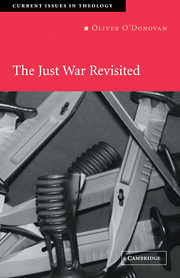4 - War by other means
Published online by Cambridge University Press: 05 June 2012
Summary
In the introduction to his major work, On War, Carl von Clausewitz wrote his most quoted dictum: ‘War is nothing but the continuation of policy with other means.’ What he meant by this, as he explained in his eighth book, was that war was not an intelligible enterprise apart from political reason. It had to be an ‘instrument’ of policy, and instruments always derive their intelligibility from the ends they serve. Read in this sense the dictum is the purest practical wisdom, and certainly supports the disciplining of war by morality. However, it has consistently been read as a slightly cynical observation; and that, I take it, is because Clausewitz relates war to ‘policy’ rather than to international justice. This tends to suggest that warfare between sovereign states is an uncomplicated and unambiguous exposition of the ordinary purposes of the state. The appearance of purely self-interested national communities exercising their strength upon their neighbours' defences is a true disclosure of the character of the civil community. This hint Clausewitz develops in a somewhat romantic nineteenth-century direction, adding his voice to the view that vitality and will are the truest realities, and that if war is the authentic prophet of national will, total war is the most outspoken form of authentic prophecy.
I want to reverse the order of the dictum and speak, instead, of the various ways in which we may continue war ‘by other means’. For if Clausewitz thought that war discloses the true nature of state policy, then, I suggest, we should say that he got it exactly the wrong way round.
- Type
- Chapter
- Information
- The Just War Revisited , pp. 95 - 108Publisher: Cambridge University PressPrint publication year: 2003

